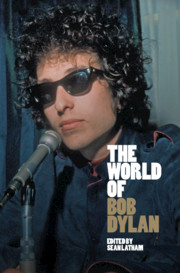Book contents
- The World of Bob Dylan
- The World of Bob Dylan
- Copyright page
- Contents
- Contributors
- Acknowledgments
- Introduction: Time to Say Goodbye Again
- Part I Creative Life
- Part II Musical Contexts
- Part III Cultural Contexts
- Chapter 12 American Literature
- Chapter 13 World Literature
- Chapter 14 The Beats
- Chapter 15 Theatre
- Chapter 16 Visual Arts: Goya’s Kiss
- Chapter 17 Borrowing
- Chapter 18 Judaism: Saturnine Melancholy and Dylan’s Jewish Gnosis
- Chapter 19 Christianity: An Exegesis of Modern Times
- Part IV Political Contexts
- Part V Reception and Legacy
- Further Reading
- Index
Chapter 12 - American Literature
from Part III - Cultural Contexts
Published online by Cambridge University Press: 21 April 2021
- The World of Bob Dylan
- The World of Bob Dylan
- Copyright page
- Contents
- Contributors
- Acknowledgments
- Introduction: Time to Say Goodbye Again
- Part I Creative Life
- Part II Musical Contexts
- Part III Cultural Contexts
- Chapter 12 American Literature
- Chapter 13 World Literature
- Chapter 14 The Beats
- Chapter 15 Theatre
- Chapter 16 Visual Arts: Goya’s Kiss
- Chapter 17 Borrowing
- Chapter 18 Judaism: Saturnine Melancholy and Dylan’s Jewish Gnosis
- Chapter 19 Christianity: An Exegesis of Modern Times
- Part IV Political Contexts
- Part V Reception and Legacy
- Further Reading
- Index
Summary
When Bob Dylan won the Nobel Prize in Literature in 2016, the rehearsal of familiar axioms about the relationship between so-called “high literature” and popular song followed. As the Nation writer David Hajdu put it just after the world’s most prestigious literary prize was handed to a rock icon, “the old categories of high and low art, they’ve been collapsing for a long time, but this is it being made official.”1 If the 2016 Nobel established that Dylan’s songs qualify as “high” art, what is their status as American literature in particular? In his Nobel Lecture in 2017, Dylan points to Moby Dick as an influence. Are Dylan’s songs therefore to be admitted to the canon of American authors that includes the likes of Herman Melville? In the same speech, he also acknowledges that he has drawn on sources that fall outside the bounds of American literature – including the poetry of John Donne, Homer’s The Odyssey, and Erich Maria Remarque’s All Quiet on the Western Front.2 So what should we make of Dylan’s mention of Melville’s tome? If Dylan’s songs are a species of “literature,” how, given his myriad literary influences, can they be understood as American literature? What he admires about Melville, he explains, is the author’s ability to create an aesthetic with “everything thrown in,” so it hardly makes sense to put too fine of a point on Dylan’s relation to any single author. Given his kitchen-sink approach to literary influence, why should we consider Bob Dylan’s work in relation to American literature at all?
- Type
- Chapter
- Information
- The World of Bob Dylan , pp. 147 - 157Publisher: Cambridge University PressPrint publication year: 2021



